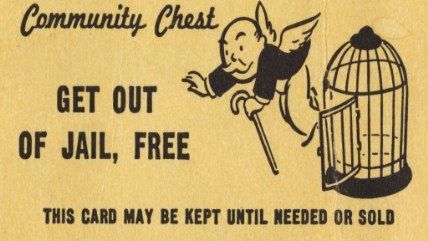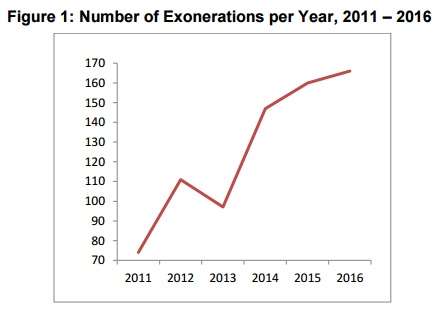Decades of Exoneration Stats Show Blacks More Likely to Be Wrongfully Convicted
Everything from official misconduct to bad eyewitness identifications to false confessions played roles.


America saw another record year for the number of prisoners being exonerated, according to the National Registry of Exonerations, a project of University of California Irvine Newkirk Center for Science & Society, University of Michigan Law School, and Michigan State University College of Law.
For 2016, 166 people were exonerated of crimes and released from prison, 52 of them for murder. Of all the exonerations, 70 cases involved official misconduct of some sort, and in 74 of the cases, convictions came from guilty pleas. And in 94 cases (also a record) it turned out that no actual crime occurred at all. These were mostly drug cases but also some child sex abuse cases. Most famously, the San Antonio Four, four women convicted in 1998 in a fabricated satanic child sex abuse ring scandal, were released in 2016 after it finally became clear the crimes never occurred.
This year researchers decided to go back over its entire history of reporting exonerations dating back to 1989 to examine the role of race in wrongful convictions. It turns out it's a big role. Try to contain your surprise. The analysis focused on the three types of crimes that have, over time, produced the greatest number of exonerations in the registry: murder, sexual assault, and drug crimes. Here's some of their calculations from 27 years of data pulled from the study's executive summary:
- African Americans are only 13 percent of the American population but a majority of innocent defendants wrongfully convicted of crimes and later exonerated. They constitute 47 percent of the 1,900 exonerations listed in the National Registry of Exonerations.
- Innocent black people are about seven times more likely to be convicted of murder than innocent white people. A major cause of the high number of black murder exonerations is the high homicide rate in the black community, the report notes, but obviously the innocent people are not responsible or contributors to the rate. Black prisoners who are convicted of murder are about 50 percent more likely to be innocent than other convicted murderers.
- African Americans imprisoned for murder are more likely to be innocent if they were convicted of killing white victims. Only about 15 percent of murders by African Americans have white victims, but 31 percent of innocent African-American murder exonerees were convicted of killing white people.
- The convictions that led to murder exonerations with black defendants were 22 percent more likely to include misconduct by police officers than those with white defendants.
- Based on exonerations, a black prisoner serving time for sexual assault is three-and-a-half times more likely to be innocent than a white sexual assault convict. The major factor for the disparity appears to be mistaken eyewitness identification by white victims.
- Assaults on white women by African-American men are a small minority of all sexual assaults in the United States, but they constitute half of sexual assaults with eyewitness misidentifications that led to exoneration.
- African-American sexual assault exonerees received much longer prison sentences than white sexual assault exonerees, and they spent on average almost four-and-a-half years longer in prison before exoneration. It appears that innocent black sexual assault defendants receive harsher sentences than whites if they are convicted, and then face greater resistance to exoneration even in cases in which they are ultimately released.
- African Americans are about five times as likely to go to prison for drug possession as whites—and judging from exonerations, innocent black people are about 12 times more likely to be convicted of drug crimes than innocent white people. Reminder: Despite what some people believe, stats show that blacks and whites use drugs at about the same rate. Blacks are more frequently stopped, searched, arrested, and convicted—including in cases in which they are innocent.
- Since 1989, more than 1,800 defendants have been cleared in "group exonerations" that followed 15 large-scale police scandals in which officers systematically framed innocent defendants. The great majority were African-American defendants who were framed for drug crimes that never occurred. The most recent of these group exonerations was just last year. Three police officers in East Cleveland pleaded guilty to federal crimes amid accusations of planting drugs and stealing cash from dozens of suspected drug dealers, all black. A conviction integrity unit at the Cuyahoga County prosecutor's office has begun vacating and dismissing the cases involved. So far they've identified 43 defendants affected.
A reader examining the studies cannot help but come away with the impression that government official misconduct combined with the obsession with the drug war (which feeds the need for results, which therefore encourages the misconduct) play a massive role in putting innocent people away. This is not to dismiss issues of race and how it affects jury decisions and eyewitness accounts—but many police and prosecutors are more than willing to use and abuse those issues to get "results."
Read the exoneration report for 2016 here. Read the special report on the relationship between race and wrongful convictions here.

Show Comments (82)